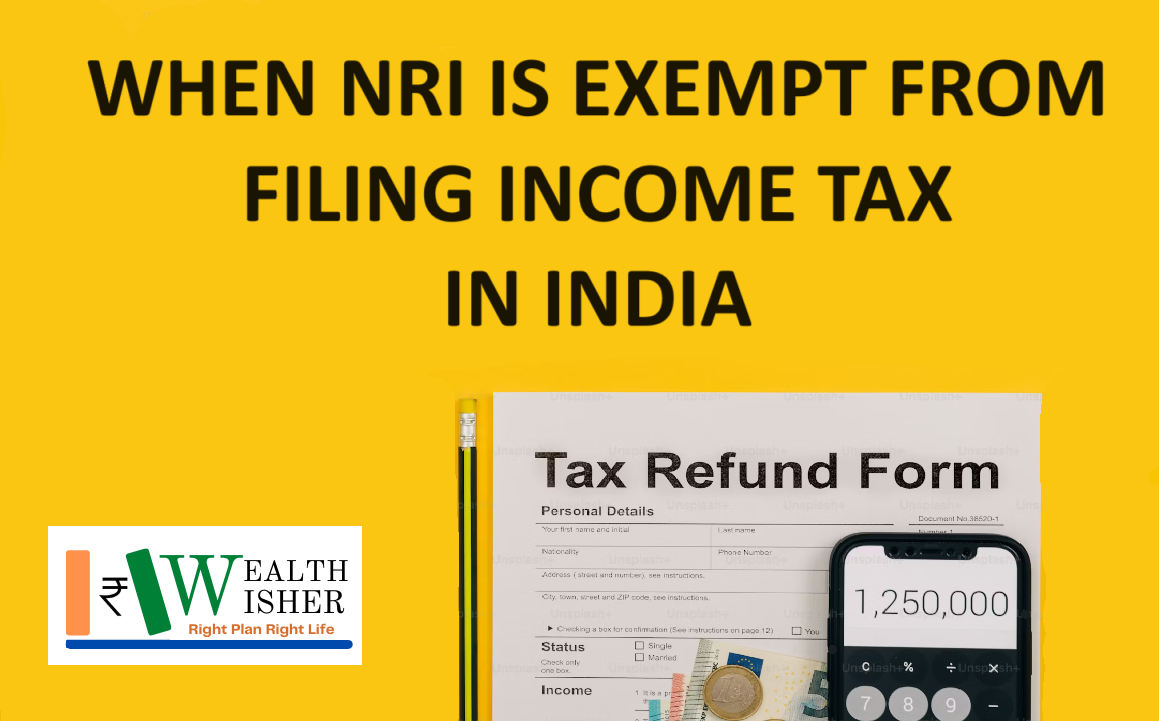It is a reverse question: When is NRI Exempt from Filing Income Tax in India? Non-resident individuals and entities can be exempted from filing an income tax return in India under certain conditions.
In most cases, as long as taxes on their income have been properly deducted at the source. But let’s check in details:
Here are the conditions under which NRI Exempt from Filing Income Tax in India –

Non-Resident Indians
Non-resident Indians don’t need to file a tax return if:
- Their income solely comes from:
- Investments in foreign exchange assets, such as shares or debentures of Indian companies.
- Long-term capital gains from these foreign exchange assets.
- The required taxes have already been deducted from this income.
Non-Resident Sportspersons
Non-resident, non-citizen sportspersons are exempt if:
- Their income includes:
- Earnings from participating in any game or sport in India (excluding lottery winnings and similar earnings as per Section 115BB).
- Revenue from advertisements.
- Payments for contributing sports-related articles in Indian newspapers, journals, or magazines.
- Taxes on these earnings have been deducted at source.
Non-Resident Entertainers
Non-resident, non-citizen entertainers are exempt if:
- Their income is derived from performances in India.
- Taxes have been deducted from this income at source.
Non-Residents with Specified Income
Non-residents, including foreign companies, are exempt if:
- Their income includes:
- Interest on bonds issued by Indian companies under specified schemes and purchased in foreign currency.
- Dividend income from Global Depository Receipts (GDRs) according to Section 115AC.
- Interest received from the Government or Indian entities on foreign currency borrowings.
- Interest from Infrastructure Debt Funds as specified in Section 10(47).
- Interest on Rupee Denominated Bonds as per Section 194LC.
- Interest on investments in Rupee-Denominated Bonds of Indian companies or Government securities as per Section 194LD.
- Distributed interest income from a Special Purpose Vehicle as per Section 194LBA(2).
- Income from mutual fund units purchased in foreign currency as specified in Section 10(23D).
- Royalty or fees for technical services received from the Government or Indian entities, provided the taxes have been deducted as per relevant provisions.
- The required taxes have been withheld at a rate not less than the prescribed rate for income items (c) to (j).
NRI Exempt from Filing Income Tax in India with Income from IFSC Investment Funds
Non-residents and foreign companies are exempt if:
- Their income is from investments in an Investment Fund established in the International Financial Services Centre (IFSC).
- This income is their only taxable income in India.
- Taxes on this income have been deducted and remitted as per Section 194LBB.
- They have not received a notice to file a return under Sections 142(1), 148, 153A, or 153C.
What is IFSC?
An International Financial Services Centre (IFSC) is a jurisdiction that provides financial services to non-residents and residents in foreign currencies. These centers are designed to offer a wide range of financial services, such as banking, insurance, asset management, and securities trading. They operate within a special regulatory framework designed to attract international business. Eg New York, Dubai International Financial Centre (DIFC), GIFT City India.
Non-Residents with Income from Specified Funds
Non-residents and foreign companies don’t need to file a return if:
- Their income comes from investments in Category III Alternative Investment Funds (AIF) that meet conditions under Section 10(4D).
- They have no other income in India.
- Taxes have been deducted and remitted.
- They have provided their details (name, email, contact number, address, and tax identification number) to the AIF.
- They have not received a notice to file a return under Sections 142(1), 148, 153A, or 153C.
Eligible Foreign Investors
Non-residents classified as eligible foreign investors are exempt if:
- They operate under SEBI’s circular.
- They only deal in capital assets listed on recognized stock exchanges in an IFSC.
- They ensure transactions are conducted in foreign currency.
- They have no other income in India apart from these capital assets.
- They provide their details (name, email, contact number, address, and tax identification number) to the stockbroker.
- They have not received a notice to file a return under Sections 142(1), 148, 153A, or 153C.
In summary, Answer to question – is NRI Exempt from Filing Income Tax in India? Yes… but if their income sources and the taxes deducted meet the specific conditions outlined above.
These conditions help in managing NRI Taxation in India.








